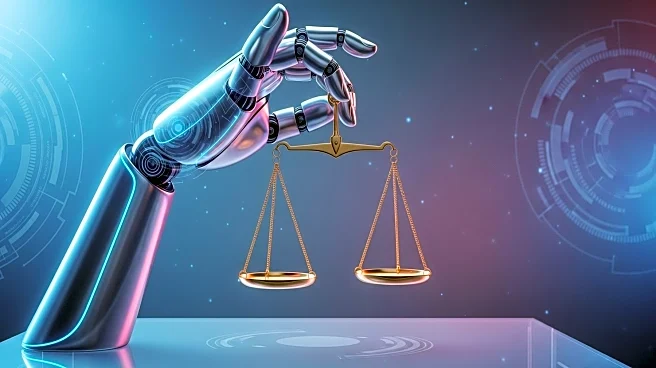What's Happening?
Iain Murdoch, head of legal AI at Mills & Reeve, is spearheading efforts to integrate artificial intelligence into legal practices. Murdoch's career trajectory shifted from traditional legal practice to technology-driven roles, including a stint at a legal tech startup. His current role involves deploying AI to enhance efficiency in legal work, focusing on tools like machine learning and document comparison software. Murdoch emphasizes the importance of training all staff, from solicitors to paralegals, in using these technologies to improve client services. His approach is not about rapid transformation but rather incremental improvements in legal processes.
Why It's Important?
The integration of AI in the legal sector represents a significant shift in how legal services are delivered. By adopting AI, law firms can increase efficiency, reduce costs, and improve accuracy in legal work. This transformation could lead to new roles within the legal industry, such as legal engineers and knowledge assistants, providing opportunities for those interested in both law and technology. As AI tools become more prevalent, legal professionals must adapt to these changes to remain competitive. Murdoch's work highlights the potential for AI to reshape the legal landscape, offering a glimpse into the future of legal practice.
What's Next?
Murdoch's focus on continuous learning and adaptation suggests that the legal industry will see ongoing changes as AI tools evolve. Law firms may increasingly invest in training programs to ensure their staff can effectively use new technologies. The success of AI integration will depend on the ability of legal professionals to embrace these tools and the willingness of firms to invest in technological advancements. As AI continues to develop, it is likely that more law firms will follow Mills & Reeve's lead in incorporating AI into their practices.
Beyond the Headlines
The ethical implications of AI in law are significant, as these technologies must be used responsibly to avoid biases and ensure fairness in legal proceedings. Additionally, the cultural shift within law firms towards embracing technology may challenge traditional legal practices and hierarchies. As AI becomes more integrated, the legal profession may need to address concerns about job displacement and the need for new skill sets among legal professionals.










